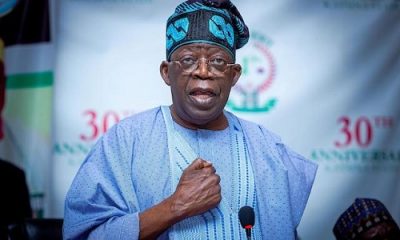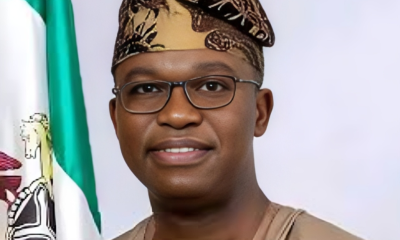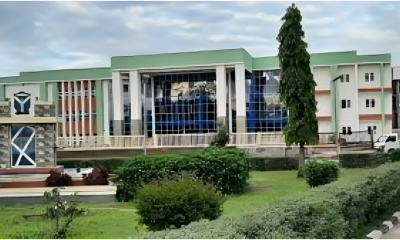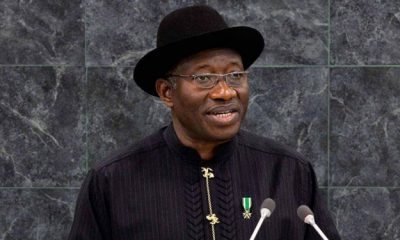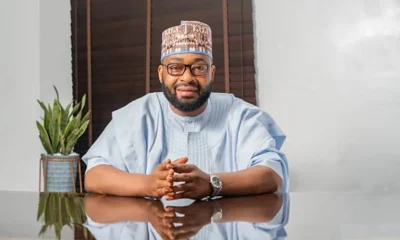NEWS
June12: Democracy Standing Strong Amidst Fires of Adversity – CAN

The Christian Association of Nigeria (CAN), says the country’s democracy has been tested by the fires of adversity but had remained steadfast because it is the best form of governance.
Its President, Archbishop Daniel Okoh, in a message to mark this year’s democracy day, emphasised the need for government to lead the country with integrity and put its citizens first.
“As we celebrate 25 years of uninterrupted democracy and the 31st anniversary of the widely acclaimed ‘freest and fairest’ presidential election of June 12, 1993, CAN congratulates the government and people of Nigeria.
“Our democracy has been tested by the fires of adversity, from the struggles of its early years to the present-day trials of insecurity, economic hardship and social injustice.
“Nevertheless, we remain steadfast in our belief that democracy is the best form of government for our nation.
“We urge the government to prioritise the common good, address pressing issues and ensure that our democracy serves the people, not just the interests of a few,” he said.
Okoh emphasised the importance of integrity, transparency and accountability in governance, saying that leaders must recognise that power is a sacred trust and that they would be held accountable for their actions.
He also stressed the need for unity and inclusivity, recognising the value of Nigeria’s ethnic, religious and cultural differences.
“Let us work together to build a stronger, more just Nigeria, where everyone has a voice and equal opportunity.
“As people of faith, we believe that democracy is a gift from God, and we must steward it wisely.
“We pray for divine guidance and wisdom for our leaders, and we urge all Nigerians to participate actively in the democratic process.
“Let us work together to build a brighter future for ourselves, our children and generations yet unborn,” Okoh stated. (NAN)
NEWS
Gov. Zulum Pardons 66, Gifts Cash to Patients, Inmates
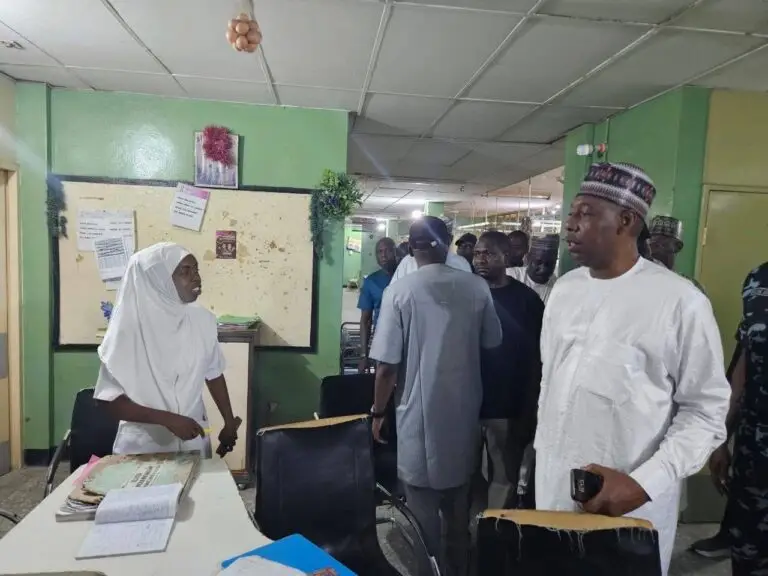
Gov. Babagana Zulum of Borno on Thursday announced a state pardon to 66 convicted persons and gifted N50,000 and N20,000 cash to each patient and inmate in the state.Report says that no fewer than 2,000 patients and 1,280 inmates were expected to benefit from the governor’s generosity at differenthealthcare facilities as well as the inmates at maximum Correctional Centre Maiduguri.
The executive pardon, the gifts and the donation of food and non-food items as well as the livestock given to the inmates were part of the line of activities marked for the celebration of Democracy Day in the state. “Let me clarify that the N20,000 cash assistance will be handed over to officials of the Correctional Centre, as stipulated by law, but you will have access to it whenever needed,” the governor said, while addressing inmates at the facility in Maiduguri.Zulum also donated 300 bags of rice, 50 jerry cans of cooking oil and five cows, in addition to the donation he made earlier to personnel at the Correctional Centre.“Based on the powers conferred on me under Section 212 of the Constitution of the Federal Republic of Nigeria as amended and the recommendation of the Advisory Committee on the Prerogative of Mercy, I Professor Zulum hereby grant state and partial pardons to 66 inmates of the Maximum Custodial Centre.“I have also commuted death sentences to life imprisonment and reduced the jail terms of some other inmates as part of activities to celebrate this year’s Democracy Day.The governor also announced plans to strengthen the vocational training centre within the facility, providing intensive literacy, numeracy, and digital skills programmes for the inmates.“I have directed the Commissioner for Education, Science, Technology, and Innovation to liaise with the management of Maiduguri Maximum Custodial Centre to enhance the vocational training centre, ensuring the provision of intensive literacy, numeracy and digital skills.“This will enable inmates to acquire valuable skills while serving their sentences,” he said.Earlier, the Controller, Borno Correctional Service, Mr Ahmed Bawa, commended the governor for his unprecedented support to the facility and its inmates.“This is the first time in history that we have received such immense support from Borno State Government under the leadership of Professor Babagana Umara Zulum.“In May this year, the governor provided the facility with 100 bags of rice, 20 cartons of cooking oil and 10 bulls.“Today, he has visited us again. On behalf of the management, staff, and inmates, we are deeply grateful,” Bawa said.The Sarki of the inmates, Daniel Simon, who spoke on behalf of the teeming inmates, commended Zulum for his generosity.He, however, expressed happiness that the dividends of the good governance of Zulum was being felt even in the correctional centre.Meanwhile, the governor has also inaugurated 20 projects being executed by his administration in the last one year.The projects included roads, housing estates, health centres, skill acquisition centres, and mega schools.Earlier, the governor visited State Specialist Hospital at 5:00 a.m., where he interacted with patients in the Gynaecology, Antenatal, Postnatal and Emergency Wards and donated N50,000 cash to each patient as support toward their medical care.Zulum, who sympathised with the patients, reaffirmed his administration’s commitment to strengthening the healthcare sector and improving access to quality medical services in the state.The governor also visited the University of Maiduguri Teaching Hospital where he extended the same gesture by donating cash and settling medical bills for patients.“Healthcare remains a top priority of this administration. We will continue to do our best to support our people in their time of need,” Zulum said.He also flagged off the construction of two hospitals and an international conference centre.The hospital projects include the Borno Orthopaedic Hospital located at Goni Kachallari and a new General Hospital at Kaleri, both in Jere Local Government Area.(NAN)NEWS
ADDRESS BY PRESIDENT BOLA TINUBU AT JOINT SESSION OF NATIONAL ASSEMBLY IN COMMEMORATION OF DEMOCRACY DAY, 2025
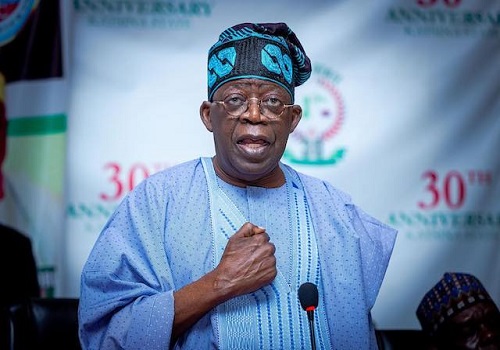
Protocol:With profound honour, I stand before this joint session of our National Assembly; a parliament that embodies the will of the Nigerian people.2. Today, as I entered this grand edifice built from the sweat and toil of our democratic yearning, my heart stirred. It was a blend of accomplishment and resolve.
3. I felt a sense of collective accomplishment when I realised how far wehad come as a nation. Since 1999, democracy has risen from the ashes anddestitution of military rule to take its rightful place as the only mode ofgovernance of our resilient and beloved people. 4. With every footstep I took through these hallowed halls up to themoment I now stand before you, I remembered that we still have muchfurther to go.5. To achieve this progress, we sought an elective office to lead thisnation forward. Thus, I hereby affirm before our Merciful and Almighty Godand all men my resolve to do all that I can to safeguard and build ourdemocracy as the Divine hand intends for us to do.6. Since 2018, we have celebrated Democracy Day on this day; tocommemorate the sacrifices of the men and women who fought to restoredemocratic governance to Nigeria.7. Let me pay tribute to former President Muhammadu Buhari forreaching back into history to rectify a national misdeed by making June 12Democracy Day and by officially acknowledging Chief Moshood KashimawoOlawale Abiola and his running mate, Babagana Kingibe, as the victors andthus duly elected President and Vice President respectively of Nigeria afterthe June 12, 1993 elections.8. Year by year, election after election, every time we debate instead ofbattle, discuss instead of fight, and argue instead of destroy, we preservethe institutions of democracy. More importantly, we weave the culture ofdemocracy into the very fabric of our nation.9. Whilst Chief MKO Abiola is June 12’s central figure, we must not forgetthe long list of those who equally deserve to be called heroes of Nigeriandemocracy.10. We must celebrate the courage of Alhaja Kudirat Abiola and Pa AlfredRewane, both of whom were murdered by agents of military repression. Wealso remember the many civil rights activists, journalists, and politiciansimprisoned, exiled, tossed aside, tortured and beaten by the military regime.11. We remember Chief Anthony Enahoro, Commodore Dan Suleiman,Chief Abraham Adesanya, Ayo Adebanjo, Chief Gani Fawehinmi, BalarabeMusa, Ganiyu Dawodu, the journalist Bagauda Kaltho, and CommodoreNdubuisi Kanu. I mention these names not to exclude or degrade theprofound contributions of anyone else, but to illustrate, through these fewheroes, the universality of our pursuit of democracy.12. The struggle was never the province of any one group or section of thecountry, it was pan-Nigerian in its conception and will be even more pan-Nigerian as we strive to perfect it.13. It is fitting that I come to this chamber. You are the authors of thepeople’s law, and I must be their faithful implementer. While we may notalways agree, we must forge a way to work together because this is whatdemocracy demands of us. I pledge myself to this cooperation and ask thatyou do the same for the good of our people.14. Mr. Chairman, the National Assembly has acted to uphold democraticideals at every critical moment in our national history. In 2006, the 5thNational Assembly protected our democracy against an unseemly third-termbid that would have ripped our constitution apart. In 2010, the NationalAssembly, through the doctrine of necessity, opened the door for then-VicePresident Goodluck Jonathan to become the acting President following theillness of his predecessor.15. Even under the military, the National Assembly tried to protect ourdemocracy. After General Abacha took over power on November 17, 1993,and dissolved the National Assembly, some of us, led by Senator AmehEbute, the Senate President in the 3rd Republic, defied the General and hisgoons to reconvene in the Old Parliament Building in Lagos. We were jailedfor our defiance.16. On behalf of a grateful nation, I commend your invaluable role inlawmaking, oversight, and constituency representation.17. At this point, I plead for your indulgence so that I may put a terrible rumour to bed.18. To those who ring the alarm that the APC is intent on a one-party state,I offer you a most personal promise. While your alarm may be as a result ofyour panic, it rings in error. At no time in the past, nor any instance in thepresent, and at no future juncture shall I view the notion of a one-party stateas good for Nigeria. I have never attempted to alter any political partyregistration with INEC. Equally, my friends, we cannot blame anybodyseeking to bail out of a sinking ship even without a life jacket.19. Look at my political history. I would be the last person to advocate sucha scheme. In 2003, when the then-governing party tried to sweep the nationclean of political opposition through plot and manipulation, I was the last ofthe progressive governors standing in my region.20. In all their numbers and false grandeur, they boasted of ruling, notgoverning, Nigeria for the next half century or more. Where are they now?21. Yet, I stood alone. My allies had been induced into defeat. Myadversaries held all the cards that mortal man could carry. Even with all ofthat, they could not control our national destiny because fate is written fromabove. A greater power did not want Nigeria to become a one-party stateback then. Nigeria will not become such a state now.22. The failed effort to create a one-party state placed progressive politicalforces on a trajectory to form the APC. It put me on the trajectory which hasbrought me before you today. I dare not do such a favour to any politicaladversary by repeating the same mistake of political overreach.23. A one-party state is not in the offing. Nor should it ever be. That said,we would be guilty of political malpractice if we closed the door on those fromother parties who now seek to join the APC and I sincerely welcome ourparty’s newest members from Delta and Akwa Ibom States led by GovernorSheriff Oborevwori and Pastor Umo Eno and other members of this NationalAssembly.24. Political parties fearful of members leaving may be better served byexamining their internal processes and affairs rather than fearfully conjuringup demons that do not exist. For me, I would say try your best to put yourhouse in order. I will not help you do so. It is, indeed, a pleasure to witnessyou in such disarray.25. We must welcome and accept the diversity and number of politicalparties just as we welcome and embrace the diversity of our population. Ourefforts must never be to eliminate political competition but to make thatcompetition salutary to the national well-being by working across the politicalaisle whenever possible.26. One area in which democracy calls us to work together, whether in thelegislative or executive branch, whether in this or other political parties, isthat of economic and social development.27. Upon assuming office, my team and I moved to reform our ailingeconomy. We introduced fundamental reforms to correct structuralimbalances that prevented maximum growth.28. We are already seeing results. GDP grew by 3.4 per cent in 2024, withQ4 hitting 4.6 per cent, the highest quarter of growth in over a decade.Inflation is easing gradually, steadying the price of food staples like rice andbeans. Our net foreign reserves have increased fivefold, and the Nairaexchange rate has stabilised. Our balance of payments position is positive;our sovereign credit rating is improving as we continue to promote oil andnon-oil exports. States now do not need to go about borrowing to paysalaries.29. In less than one year, over one hundred thousand Nigerians, including thirty-five thousand civil servants, have benefited from affordable consumer credit through the Nigerian Consumer Credit Corporation (CREDICORP), enabling them to purchase vehicles, light up and improve their homes and purchase life essentials. This July, we will launch a bold new initiative to empower four hundred thousand young Nigerians, including youth corpers, with consumer credit.30. We are committed to giving more opportunities to young people through job creation and skills development. Through such programs as NELFUND, we are investing in education, vocational training, apprenticeships, and internships to ensure our youth are job-ready andfuture-ready.31. In addition, we have embarked on an ambitious project to lay fibre optic cables across the nation, a transformative step toward bridging the digital divide and fostering greater connectivity. This initiative promises not only to enhance the speed and reliability of internet access but also to revolutionize how businesses operate, how students learn, and how communities stay connected. By extending this critical infrastructure, we are empowering entrepreneurs, enabling digital education, and providing the tools for our youth to compete in a globalized world.32. Our “Nigeria First” policy will further enhance progress as we consolidate market-driven growth. The improved economic performance is encouraging and validates the soundness of our policy measures. Our medium-term growth target remains an economy growing at a 7 per cent clip with a stronger manufacturing base. We must learn to produce and grow most of our food and we are on the path to achieving food sovereignty.33. These and other reforms have placed the economy on a more rational footing where critical decisions regarding large-scale investment can now be made.34. I ask you, the legislature, to join me as we enter the second half of our term to put forth innovative legislation that further encourages industrial development and job creation in our urban centres while also drafting laws that improve food security and production.35. To further underpin our economic vision, we introduced a comprehensive Tax Reform Package, a vital component of our economic re- engineering. I am deeply grateful to both chambers for your thorough consideration and deliberation of these bills, and I look forward to signing them into law soon.36. Again, your collaboration across party lines on these bills has been a model of democratic partnership.37. As elected leaders, we must continue to do more to make real the dream of Nigeria’s political and economic democracy.38. We must be vigilant in expanding the political space. We must always value dialogue over dictatorship, persuasion over suppression and rights over might. Be tolerant and broad-minded in your legislative action regarding speech and civil liberties.39. Do not be afraid to hear an unkind word spoken against you. Some of the best advice a politician gets sometimes comes from his most ferocious opponents. We dare not seek silence because the imposed silence of repressed voices breeds chaos and ill will, not the harmonics of democracy in the long term.40. While malicious slander and libel should not go unattended, no one should bear the brunt of injustice for merely writing a bad report about me or calling me names. Democracy requires a fair degree of tolerance for harsh words and stinging insults. Call me names, call me whatever you will, and I will still call upon democracy to defend your right to do so. Mr. Senate President, Mr. Speaker, Distinguished Senators and Honourable Members.41. Our nation is not perfect, but it is strong. Our democracy is not invincible, but it is alive. And this means our dream of a prosperous, happy nation is still within reach and worth fighting for.42. Mr. Chairman, Nigeria is at an inflexion point, undergoing structural and fundamental change toward a secure future.43. Our administration is fully committed to boosting the economy’s productive base. Through investment in critical infrastructure, roads, expansion of port operations, rail, and power we are creating a new environment in which industry and manufacturing can thrive. Our tax and fiscal policy reforms will streamline tax administration and eliminate burdensome and multiple taxes enabling our industrialists and entrepreneurs to operate in a more conducive environment.44. Governance must work and deliver value to the people. As part of our tax reforms, we have provided small businesses with an exemption and established the Office of the Tax Ombudsman to ensure transparency and protect taxpayer rights. Digital tools now help us track performance and reduce waste. The Diaspora Bond and Non-Resident BVN are bringingNigerians abroad into the national development fold.45. In line with my promise during my New Year address to the nation, I recently appointed the board of directors of the newly established National Credit Guarantee Company. The company backed with 100 billion naira in initial capital; with BOI, which, by the way, is performing very well in supporting SMEs, NSIA, CreditCorp, and MOFI as stakeholders, will play a significant role in transforming the nation’s industrial landscape and reducingcorruption.46. National Security is the foundation of peace and progress. We have intensified security operations to reclaim communities from criminals and terrorists. We are better at coordinating intelligence, and inter-agency cooperation has improved. Our highways are safer, and we invest in technology and training to secure every inch of this country.47. Let us take this opportunity to thank the men and women of our Armed Forces for their bravery in service of the nation. Their selfless dedication to protecting our sovereignty and ensuring the safety of citizens should serve as an inspiration to us all. As we celebrate the progress of our democracy, we must not forget the pivotal role they play in safeguarding our freedoms. For their courage and commitment, they deserve not only our gratitude butalso our continued support, prayers and recognition.48. Fellow compatriots, our achievements are not the work of one man. They are the result of a collective effort to make possible the Nigerian Dream. Yet, the journey is not over. We must work even harder to translate broad macroeconomic gains into tangible improvements in the lives of ordinary Nigerians. We must stay the course, reject cynicism, and believe Nigeria can and will rise again.49. As we mark a twenty-sixth year of unbroken democracy, it is right to honour those who have made sacrifices in the past, braving all the odds and the guns to ensure we have a regime of democracy in our country.50. In this light, I announce the conferment of the posthumous national honour of CFR on Kudirat Abiola, the heroine of the June 12 struggle.51. I also confer posthumous national honours on Shehu Musa Yar’Adua (GCFR), Prof. Humphrey Nwosu (CON), Rear Admiral Ndubuisi Kanu (CON), Alhaji Balarabe Musa (CFR), Pa. Alfred Rewani (CFR), Bagauda Kaltho (OON), Chima Ubani (OON), Dr. Beko Ransome-Kuti (CON), Alao Aka Bashorun (CON), Chief Frank Kokori (CON), Emma Ezeazu (OON), Bamidele Aturu (OON), Fredrick Fasehun (CON), Professor Festus Iyayi (CON), Dr John Yima Sen (OON), Alhaja Sawaba Gambo (CON), Dr. Edwin Madunagu (CON), Dr. Alex Ibru (CON), Chief Bola Ige (CFR), Pa. Reuben Fasoranti (CFR), Sen. Ayo Fasanmi (CON), Sen. Polycarp Nwite (CON) and Dr. Nurudeen Olowopopo (CON).52. I also confer national honours on Prof. Wole Soyinka (GCON), Prof. Olatunji Dare (CON), the journalist and journalism teacher; Kunle Ajibade (OON); Nosa Igiebor (OON), Dapo Olorunyomi (OON), Bayo Onanuga (CON), Ayo Obe (OON), Dare Babarinsa (CON), Bishop Matthew Hassan Kukah (CON), Senator Shehu Sani (CON), Governor Uba Sani (CON), Barrister Femi Falana, SAN (CON), Prof. Shafideen Amuwo (CON), Barrister Luke Aghanenu (OON), Senator Tokunbo Afikuyomi (CON), Hon. Labaran Maku (OON), Dr. Tunji Alausa (CON), Mr Nick Dazang (OON), Hon Abdul Oroh (OON), Odia Ofeimun (CON), Seye Kehinde (OON), Barrister Felix Morka (CON) Barrister Ledum Mitee (CON), Hon. Olawale Osun (CON), Dr. Amos Akingba (CON), Prof. Segun Gbadegesin (CON), Mobolaji Akinyemi (CFR), Dr. Kayode Shonoiki (CON), Prof. Julius Ihonvbere (CON), Prof. Bayo Williams (CON), Sen. Abu Ibrahim (CFR), and Sen. Ame Ebute (CFR).53. Additionally, I confer the national honour of CON on Uncle Sam Amuka Pemu, a legendary journalist and publisher who remains true to his lifetime calling as he marks his 90th birthday tomorrow, June 13.54. Furthermore, I also confer posthumous national honours on Ken Saro Wiwa (CON), the leader of the Ogoni Nine and his fellow travellers, Saturday Dobee (OON), Nordu Eawo (OON), Daniel Gbooko (OON), Paul Levera (OON), Felix Nuate (OON), Baribor Bera (OON), Barinem Kiobel (OON), and John Kpuine (OON). I shall also be exercising my powers under the prerogative of mercy to grant these national heroes a full pardon, together with others whose names shall be announced later in conjunction with the National Council of State.55. Finally, it is my great privilege to now decorate the presiding officers of the National Assembly with the National Honours earlier conferred upon them last year:Presiding National Assembly OfficersSenator Godswill Obot Akpabio, GCON – SENATE PRESIDENTRt. Hon. Abbas Tajudeen, PhD, GCON – SpeakerSenator Jibrin Ibrahim Barau, CFR – DEPUTY SENATE PRESIDENTRt. Hon. Benjamin Okezie Kalu, CFR – Deputy Speaker56. In conclusion, let us rededicate ourselves to the ideals of June 12; freedom, transparent and accountable government, social justice, active citizen participation, and a just society where no one is oppressed.57. Happy Democracy Day, and may God continue to bless the Federal Republic of Nigeria and protect our troops.Bola Ahmed Tinubu, GCFRPresident, Commander-in-Chief of The Armed Forces,Federal Republic of Nigeria.NEWS
Calls for Lowering Voting Age, Rejection of e-voting Dominate NILDS-Democracy School Debate

Calls for lowering voter age and rejecting e-voting on Wednesday in Abuja dominated the maiden edition of the National Institute for Legislative and Democratic Studies (NILDS)-Democracy Secondary School debate.Students from Africa Community School, Asokoro and Intelligence Quotient Academy, who emerged winners, made the call at the debate, organised to mark Nigeria’s 26th anniversary of unbroken democracy.
Report says that the topic of the debate was “Is E-Voting the Future of Nigeria’s Democracy/Should the Voting Age Be Lowered to 16 years. ”Miss Khadijah Matawale, a student of Intelligence Quotient Academy, said that every citizen had the right to life, freedom of speech and movement, and should be given the right to vote.Matawale described voting as a process of electing leaders in a democratic setting by citizens, arguing that teenagers at the age of 16 are equally citizens.According to her, if the aged have the right mindset to vote and have a say in what is going in government, teenagers at age 16 should also be allowed to vote.“If everybody, irrespective of age or experience, is affected by bad governance, why can’t voting age be reduced to accommodate those of 16 years of age?“In countries like Australia, Cuba and Brazil, they allow teenagers, 16 and 17 years of age to vote; why can’t that be implemented in Nigeria?” she queried.On her part, Miss Oluwadamilola Wright of Africa Community School, argued that though technology looked like the way forward, there were lots of constraints.Wright said that transparency could not be assured, as operators of the system were those appointed by people in power, thus making it difficult to be sure if the output was the will of the people or government officials.She also stated that electronic systems could be very expensive to acquire and operate.In his own contribution, Master Ogbodo Kelvin, of Government Secondary School, Area 10, Garki, argued that e-voting was the future of Nigeria’s electoral system and across the world.Kelvin noted that the world was changing in terms of technological advancement and that e-voting would ensure empowerment, transparency and reduction in electoral fraud.“We’re in a world where climate change is affecting us a lot. We will consume a lot of parts with manual voting but with e-voting, it will reduce the use of paper; we are conscious of our plight; it is democracy with a conscience,” he said.However, Miss Oluwapamilerinayo Abobarin, an SS II student of Treasure Homes International Schools, argued that voting should be done by adult citizens alone.Abobarin said that it was risky to allow younger teenagers to vote in deciding t fate of a complex nation like Nigeria.“A 16-year old is not emotionally stable. Science shows that the part of the brain responsible for decision-making is not yet developed until mid-twenties.“This is enough reason for us to see that a 16-year-old is not mature enough for such decision for the whole nation.“They are still very dependent on their parents; they are easily influenced and manipulated by social media influencers, easy prey for cyber bullies and can be forced by someone in their neighbourhood to vote for a particular candidate.“Imagine a 16-year-old becoming president of Nigeria, because the right to vote comes with the right to be voted for,” she said.In an interview , the General-Manager of NILDS-Democracy Radio, Mrs Uju Nwachukwu, said that the initiative was centered around questions of interest to young people.Nwachukwu said that following social media comments of young people after the 2023 elections, the debate was designed to propel new thinking among young people.“What we are trying to do is more of awareness on governance and politics for younger people.“At NILDS-Democracy Radio, our mandate is to bridge information gap between the governed and the government, and we are not leaving the younger generation.“We want to get the younger generation talking; they are the younger demography that is most often over-looked; they will turn 18 in two years.“At some point in time, they are going to be part of the system; so getting them involved now is a better strategy than waiting until that time where they express their discontent by other means like riots and protests.“Getting them intellectually involved now, getting them to do research and understand things for themselves is the essence of this conversation,” she said.Nwachukwu said that young people were very impressionable, as they could easily convince their peers to run with such ideas.The general manager said that the debate would not be a one-off event but would be expanded to include university students. (NAN)


